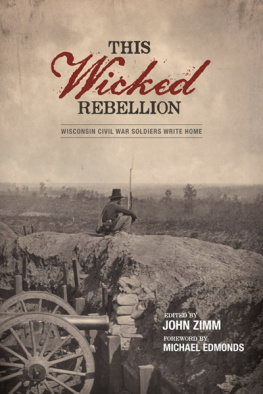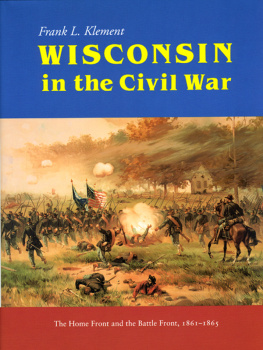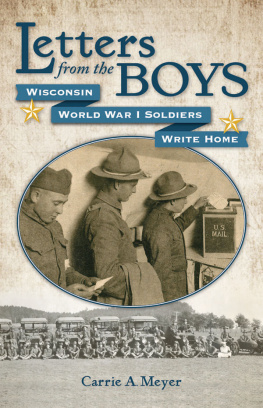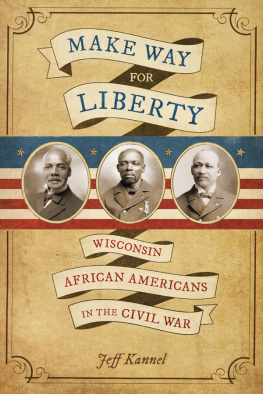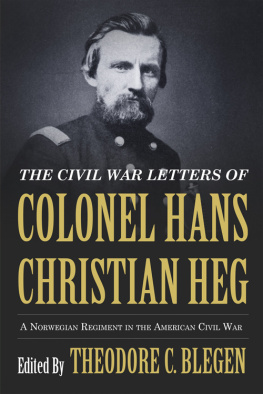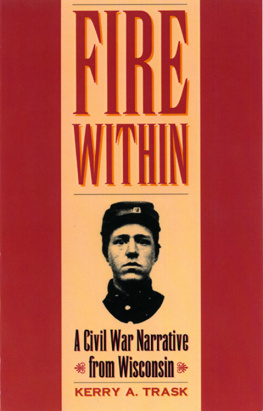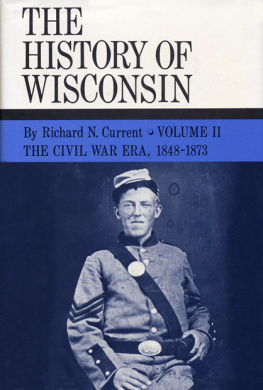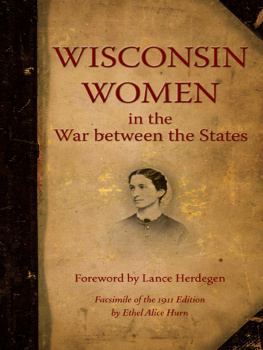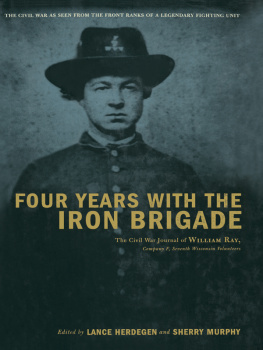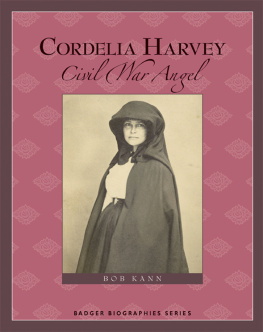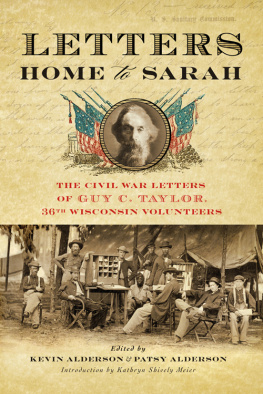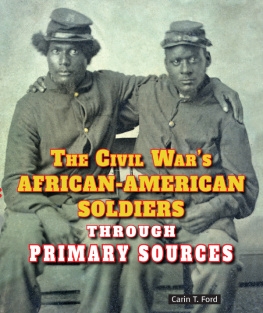JOHN ZIMM received a BA in history from the University of WisconsinMadison and has worked for the Wisconsin Historical Society Press since 2002. His articles for the Wisconsin Magazine of History include On to Montezumas Halls: The Story of Alexander Conze and Wisconsins Historic Windmills. John lives in Waunakee, Wisconsin, with his wife and son.
MICHAEL EDMONDS is deputy director of the Wisconsin Historical Societys Library-Archives. A member of the staff since 1982, he leads the effort to digitize manuscripts and rare books for the Wisconsin Historical Society website. His 2009 book on Paul Bunyan, Out of the Northwoods, won the Wayland D. Hand Prize from the American Folklore Society.
CHAPTER 1
The War in the North
THE WINTER of 1860 to 1861 was an uncertain time. Southern states left the union every few days until by February 1, 1861, a total of seven had seceded. With the bombardment and surrender of Fort Sumter in mid-April, a tense war of words and bravado gave way to the raising and training of armies as President Abraham Lincoln called for 75,000 troops to subdue combinations too powerful to be suppressed by the ordinary course of judicial proceedings, or by the powers vested in the marshals by law.
Initially asked to provide only one regiment of 780 men, Wisconsin would eventually send over 80,000 young men to war, 11,000 of whom did not return. Before they could go to war, however, these men had to be mustered into the army, given a uniform and a gun, and provided with a minimal amount of training. To this end, camps were constructed in Milwaukee and Madison where men were sent to become soldiers, the most famous being Madisons Camp Randall. Young men who had probably never ventured far from home found life in these camps at once tedious and entertaining, despising drill yet finding plenty of opportunities to entertain themselves with songs, dances, or tomfoolery about town.
Challenging times lay ahead for those at home left to work the fields, mind the stores, and keep Northern society functioning even as so many young men were away fighting the rebellion. Women were particularly affected as they raised families alone, endured separation from their husbands and fathers, and began to take on the work that men had traditionally done. Women had to rely on the kindness of their neighbors and sometimes found that promises of help did not materialize.
Nor were military affairs restricted to the South. In the fall of 1862, draft rioters raised havoc in several Wisconsin communities. Troops that had planned to go south in the fall of 1862 found themselves instead marching through Wisconsin, hunting down rioters and those evading the draft, or heading to the Wisconsin-Minnesota border to suppress Indian troubles. Other regiments were retained at Camp Randall to guard Confederate prisoners housed there or to suppress a mutiny among Wisconsin troops who refused to go to the front. Meanwhile, Wisconsin soldiers in the field were fighting and dying and being forever changed by the experience, as many mothers and fathers, wives and children found out when their loved ones returned home from the front.
Leaving Home
Having been accepted into service, companies were sent to Milwaukee or Madison to learn the basics of nineteenth-century soldiering. At railroad depots around the state, scenes like the following occurred as communities sent their young men off to become soldiers.
Departure of the Beloit City Guards.
Never did this city witness such a spectacle as was presented last Friday upon the departure of the Beloit City Guards, for their rendezvous at Milwaukee. The entire population of the city, and many persons from the adjacent country, assembled to witness the embarkation of the first company from Rock County. The streets were thronged with people, and every available position in the vicinity of the depot was occupied by spectators, long before the hour of departure had arrived. It was found necessary to stretch a rope from the depot to State street, in order to keep open a space between the crowd and the cars for the occupation of the troops. The rooms and platform of the depot were occupied by the relatives of the soldiers that were to leave. The Beloit Cadet Rifles, the Home Guard, the Firemen, and the Union Guards of Winnebago Co., Ill., under command of Capt Burroughs, were drawn up in order to receive the City Guards. At 12 oclock, this company, headed by the City Band playing Yankee Doodle, marched up in front of the depot, where they were addressed by Mayor Parker, who pledged the Company the faith of the City that those whom they left behind should be faithfully cared for during the term of their absence. Rev. Dr. Brinsmade on behalf of the American Bible Society presented to each member of the Company a copy of the Bible, accompanying the presentation to Capt. Clark with a few appropriate remarks, which were followed with prayer.
The time for the departure of the train having arrived the Company was ordered aboard, and hasty words of parting were exchanged between husbands and wives, mothers and sons, sisters and brothers.
The scene at this moment was most touching and solemn. Stout hearts melted, and eyes unused to weep were suffused with tears. Never before had the dire exigencies of war been brought home to the people of this city in such sad earnest, and a deeper desire was begotten in every heart to strike down the traitors who had brought this evil upon the land.
As the train moved off three mighty cheers were given for the departing troops, and the multitude dispersed.
Vol. 1, p. 1
THE PARTING.
One parting scene we must not fail to chronicle. A husband, a stalwart man, was taking the last leave of his wife;a hasty kiss was exchangeda warm grasp of the hand, and the soldier, as he was about turning away, stooped to kiss his child, a little girl of three summers. The child put her arms about the fathers neck, clasped them tightly, and sobbed most piteously. She would not let him go, and he was forced to unclasp her hands with his own strong arms, and hand her back to her weeping mother, while the big tears rolled down his manly cheeks,still he faltered not, but bravely resumed his place in the ranks. Incidents such as this try the reins and test the courage of a man more than facing the storm of lead and iron hail from the ranks of the enemy.
In a few moments the volunteers were all aboard, and amid the booming of cannon, and the rolling of drums, the train whizzed away, and the Delavan Guards were lost to our sight. Thus closed one of the saddest days of the year.
Vol. 6, pp. 16566
A soldier corresponding for the Wisconsin Daily Argus took pen in hand to write a lengthy description of Camp Randall, which would be the primary training ground for Wisconsins Civil War soldiers.
Camp Randall,
Madison, Dec. 15, 1861.
EDS ARGUS:This Camp to which has been given the name of the best of Wisconsin Governors, was fitted up in 1860 for the annual fair of the Wisconsin State Agricultural Society. It is some 10 acres in extent, in nearly a square form, being somewhat the longest from north to south, and is surrounded by a board fence eight feet in height. The fence is constructed by setting posts in the usual manner, placing the cross-scantling as if for picket fence, then nailing on the eight-feet boards perpendicularly, making a fence which is almost proof against climbing from the outside, but one which is quite easily scaled from the inside, owing to the scantling placed horizontaly for the support of the boards, which make convenient steps for the feet of any person who desires to use them as such. This fact renders it necessary to place a strong guard around the inside of the Camp, to prevent the exit of truant soldiers, which are quite plenty here as you can imagine.
Next page
